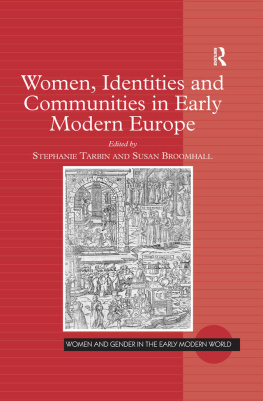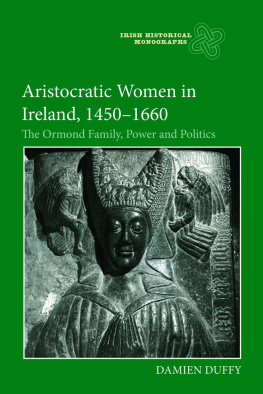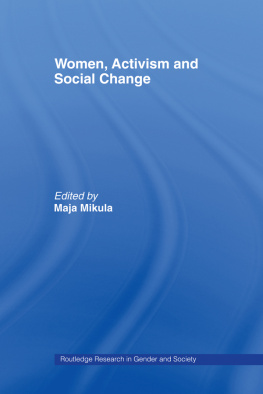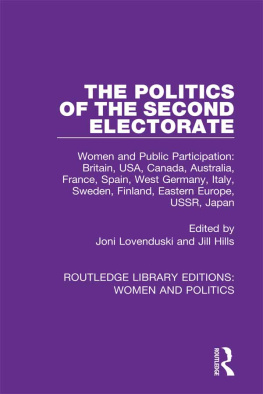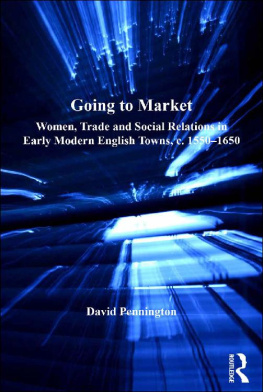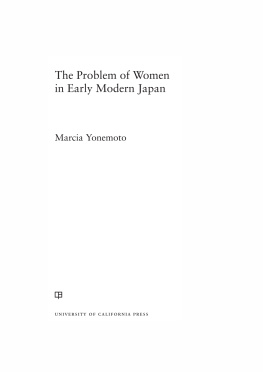WOMEN, IDENTITIES AND COMMUNITIES IN EARLY MODERN EUROPE
Women and Gender in the Erly Mdern World
Series Editors: Allyson Poska and Abby Zanger
In the past decade, the study of women and gender has offered some of the most vital and innovative challenges to scholarship on the early modern period. Ashgates new series of interdisciplinary and comparative studies, Women and Gender in the Erly Modern World, takes up this challenge, reaching beyond geographical limitations to explore the experiences of early modern women and the nature of gender in Europe, the Americas, Asia, and Africa. Submissions of single-author studies and edited collections will be considered.
Titles in this series include:
Genre and Womens Life Writing in Early Modern England
Edited by Michelle M. Dowd and Julie A. Eckerle
Midwifery, Obstetrics and the Rise of Gynaecology The Uses of a Sixteenth-Century Compendium
Helen King
Ottoman Women Builders The Architectural Patronage of Hadice Turhan Sultan
Lucienne Thys-Senocak
Gender, Race and Religion in the Colonization of the Americas
Edited by Nora E. Jaffary
From Wives to Widows in Early Modern Paris Gender, Economy, and Law
Janine M. Lanza
Women, Identities and Communities in Early Modern Europe
Edited by
Stephanie Tarbin
The University of Western Australia
Susan Broomhall
The University of Western Australia
First published 2008 by Ashgate Publishing
Published 2016 by Routledge
2 Park Square, Milton Park, Abingdon, Oxon OX14 4RN
711 Third Avenue, New York, NY 10017, USA
Routledge is an imprint of the Taylor & Francis Group, an informa business
Copyright Stephanie Tarbin and Susan Broomhall 2008
All rights reserved. No part of this book may be reprinted or reproduced or utilised in any form or by any electronic, mechanical, or other means, now known or hereafter invented, including photocopying and recording, or in any information storage or retrieval system, without permission in writing from the publishers.
Notice:
Product or corporate names may be trademarks or registered trademarks, and are used only for identification and explanation without intent to infringe.
Stephanie Tarbin and Susan Broomhall have asserted their moral right under the Copyright, Designs and Patents Act, 1988, to be identified as the editors of this work.
British Library Cataloguing in Publication Data
Women, identities and communities in early modern Europe.
(Women and gender in the early modern world)
1. Women Europe Social conditions 16th century 2. Women Europe Social conditions 17th century 3. Women Europe Identity History 16th century 4. Women Europe Identity History 17th century I. Crawford, Patricia (Patricia M.) II. Broomhall, Susan III. Tarbin, Stephanie
305.4'2'094'0903
Library of Congress Cataloging-in-Publication Data
2007010750
ISBN 9780754661849 (hbk)
To Professor Patricia Crawford Scholar, colleague, mentor, friend
Susan Broomhall is Associate Professor in Early Modern History at The University of Western Australia. She is author of Women and the Book Trade in Sixteenth-Century France (Ashgate, 2002), Womens Medical Work in Early Modern France (Manchester University Press, 2004), Women and Religion in Sixteenth-Century France (Palgrave, 2006) and editor of Emotions in the Household, 12001900 (Palgrave, 2007). She is completing a study of the sixteenth-century urban poor in France.
Sarah Ferber is senior Lecturer in History at the University of Queensland. Her book Demonic Possession and Exorcism in Early Modern France was published by Routledge in 2004.
Laura Gowing is Reader in Early Modern History at Kings College, London. Her books include Domestic Dangers: Women, Words, and Sex in Early Modern London (Oxford University Press, 1996) and Common Bodies: Women, Touch and Power in Seventeenth-Century England (Yale University Press, 2003).
Frances Harris is Head of Modern Historical (post-1603) Manuscripts at the British Library. She is the author of A Passion for Government: the Life of Sarah, Duchess of Marlborough (Oxford University Press, 1991), Transformations of Love: the Friendship of John Evelyn and Margaret Godolphin (Oxford University Press, 2003) and co-editor, with Michael Hunter, of the essay collection, John Evelyn and his Milieu (British Library, 2003).
Sybil Jack is an Emeritus Professor in the University of Sydney who has published extensively on early modern British History. Her publications include Towns in Tudor and Stuart Britain (Palgrave Macmillan, 1996) and Trade and Industry in Tudor and Stuart England (Unwin Hyman, 1977). She is currently working on a study of British queenship.
Anne Laurence is Professor of History at the Open University, UK, where she has worked since 1976. She is author of Women in England 15001760: A Social History (Weidenfeld and Nicolson, 1994). Her research interests lie in the comparative study of women in England, Scotland, Ireland and Wales and in women and patronage in the early modern period. She is engaged in a large research project on women and finance in the early eighteenth century.
Dolly MacKinnon is a Fellow in the History Department at the University of Melbourne. She lectures in early modern history, as well as music history, and film music in the Faculty of Music. Her interdisciplinary publications span the areas of early modern and modern social history, women, gender, and music, and the social history of medicine. She is author of Revealing the Early Modern English Landscape: Earls Colne (Ashgate, 2008). She has co-edited and contributed to Madness in Australia: Histories, Heritage and the Asylum (University of Queensland Press, 2003) (with Catharine Coleborne), and Hearing Places (Cambridge Scholars Press, 2007) (with Ros Bandt and Michelle Duffy).
Philippa Maddern is Professor in History at the University of Western Australia. She teaches and researches in the social and cultural history of late-medieval England, with a particular focus on East Anglia, and a major interest in gender and family history. Her book Violence and Social Order: East Anglia 14221442 (Oxford University Press, 1992) investigated the social characteristics and cultural meanings of violence in late-medieval England. She has since co-edited a book with Professor Crawford on Women as Australian Citizens: Underlying Histories (Melbourne University Press, 2001), and has published several articles on such topics as late-medieval domestic violence, public order in late-medieval Norwich, and friendship networks in late-medieval Norfolk.
Sara Mendelson is Associate Professor in the Arts and Science Programme at McMaster University, and a Fellow of the Royal Historical Society. She is the author of The Mental World of Stuart Women: Three Studies (1987), Women in Early Modern England 15501720 (1998) (co-author Patricia Crawford), and Paper Bodies: A Margaret Cavendish Reader (2000) (co-author Sylvia Bowerbank), as well as articles on Stuart womens diaries, disorderly women, early modern sexual identities (with Patricia Crawford), womens working lives, womens civility, Margaret Cavendish, and Queen Elizabeth I. Current work in progress explores the interactions between gender and popular culture in early modern England.
Judith M. Richards is a member of the History Programme at La Trobe University. In recent years she has published a range of essays discussing gender, monarchy and authority in early modern England. Published in Britain, USA and Australia these essays have explored in particular the impact of female monarchs on received assumptions about constitutional thought, political culture and popular attitudes to monarchy as well as emergent national identity. Her study of the life and reign of Mary Tudor, Englands first queen regnant, will be published by Routledge in 2008.

